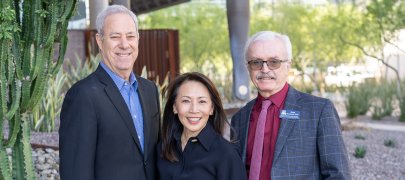Faculty Spotlight: Pamela Garcia-Filion, PhD, MPH
Pamela Garcia-Filion, PhD, MPH, a research scientist and associate professor in the Department of Biomedical Informatics at the University of Arizona College of Medicine – Phoenix, was awarded this year’s best original paper from North America published in Hormone Research In Paediatrics (HRP).

The birth defect known as optic nerve hypoplasia (ONH) has emerged as the leading ocular cause of childhood blindness and visual impairment in the United States and Europe. Underdevelopment of the optic nerve is the defining feature of ONH, however, the diagnosis of ONH is rarely limited to visual impairment, and the majority of cases involve brain malformation, endocrinopathy, developmental delay and autism. It is also known as septo-optic dysplasia.
“The prevalence of ONH has increased ten-fold to the current estimate of 5 per 10,000 infants,” Dr. Garcia-Filion said. “A child diagnosed with ONH will undergo a number of evaluations and brain function tests. At the time of diagnosis, parents are not only devastated by the diagnosis but they also face some degree of uncertainty about the scope of their child’s health and developmental needs.”
Dr. Garcia-Filion’s research came from an ongoing, prospective, longitudinal registry study. Infants and toddlers enroll in this registry before the age of two and undergo multi-disciplinary clinical evaluations and testing every year until five years of age. The registry has existed since 1992, and constitutes the largest clinical cohort of ONH patients in the world with more than 300 subjects and an average of 3,000 data points per subject.
The registry is a collaboration between the University of Arizona and the University of Southern California Children’s Hospital Los Angeles.
Dr. Garcia-Filion is the data scientist and informaticist who built the registry’s data infrastructure, oversees and directs data governance and data management. The research represents a collaboration between informatics and clinical practice.
“I’ve been part of this registry since 2002, and we work tirelessly to improve the care and health outcomes for this vulnerable population,” Dr. Garcia-Filion said. “We’ve published many papers on ONH, but this publication was our greatest accomplishment thus far.”
In 2002, an initiative was launched to design a data architecture on an informatics platform that could accommodate the registry’s scope of clinical data from ophthalmology, neurology, radiology, electrophysiology, endocrinology and neuropsychology. The result was a centralized data repository with a governance structure that automates the capture and management of clinical data that is accurate and complete.
The informatics methodology established a robust data source from which clinical data is readily available for residents and fellows to use for research. The current publication is the most recent of 18 publications generated from the rare disease registry.
“Academic research requires a dedication to excellence with the hope that relentless scientific pursuit will eventually move clinical practice and improve population outcomes,” Dr. Garcia-Filion said. “The national recognition of our paper means that our research reached review at a national level and achieved priority recognition over thousands of other important reports. This means we are indeed impacting clinical practice and helping children live fuller lives.”
About the College
Founded in 2007, the University of Arizona College of Medicine – Phoenix inspires and trains exemplary physicians, scientists and leaders to optimize health and health care in Arizona and beyond. By cultivating collaborative research locally and globally, the college accelerates discovery in a number of critical areas — including cancer, stroke, traumatic brain injury and cardiovascular disease. Championed as a student-centric campus, the college has graduated more than 800 physicians, all of whom received exceptional training from nine clinical partners and more than 2,700 diverse faculty members. As the anchor to the Phoenix Bioscience Core, which is projected to have an economic impact of $3.1 billion by 2025, the college prides itself on engaging with the community, fostering education, inclusion, access and advocacy.


